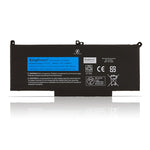You have no items in your shopping cart.
Does hibernating my laptop drain the battery?

Before we discuss this, you should understand these three modes.
Shutdown: This is the shutdown state most of us are familiar with. When you shut down your laptop, all open programs close and the laptop shuts down your operating system. A laptop that is turned off uses almost no power.
Sleep: Also known as Sleep or Standby. In sleep mode, the laptop enters a low power state. The power is used to keep the state of the laptop in memory, but the rest of the laptop is powered off and doesn't use any power. However, this consumes more power than shutting down or hibernating the computer.
Hibernation: Your laptop saves its current state to your hard drive, essentially dumping the contents of its RAM to a file on the hard drive. When you start your computer, it loads the previous state from your hard drive into its RAM. Resuming from hibernate takes longer than sleep, but hibernate uses much less power than sleep. A hibernating laptop consumes about the same amount of power as a powered off laptop.

Kingsener SK616 Mini Portable UPS with 5V/9V/12V/15V/24V DC Interface & USB Port Max 24W 2A Current Output & 13200mAh Lithium Battery For Travel And Camping Field work
Does your laptop consume a lot of power when it's in hibernation?
So, if it's a laptop, the power consumption is one-third of that of a desktop. Generally, the power consumption of a desktop computer is about 250-400W per hour, that is, it can be used for three or four hours on a single charge. When the computer is in standby, it will turn on some monitors and the like, which will consume a small amount of power.
Some suggestions and measures for saving electricity and energy.
If the expected suspension time is less than 1 hour, it is recommended to put the computer on standby. If the pause time is greater than 1 hour, it is best to completely shut down the computer.
Under normal circumstances, after using the notebook computer, you should unplug the power plug or turn off the switch on the power strip. And get in the habit of shutting down your computer completely instead of leaving it plugged in.
Turn off printers, speakers, and other peripherals when not in use.
Temporarily unused devices such as OCD-ROM drives, network cards, and sound cards can be disabled in the BIOS. (The power consumption won't drop much, but in the long run, it can extend the life of the device).
Use CPU cooling software.
Reduce the brightness of the display. While text editing, dim the background a bit to save energy while protecting your eyesight and reducing the intensity of eye strain. Turn off the display completely when the computer is playing a single audio file, such as music, book reviews, or novels.
Don't overclock. If the performance requirements can be fully met without overclocking, then overclocking should be done as little as possible, which is energy-saving, stable and safe.
If this article still doesn't help your laptop battery, you can buy a new battery at BatteryMall.com
If you want to learn more about batteries, please visit:BatteryMall.com/blogs/support








